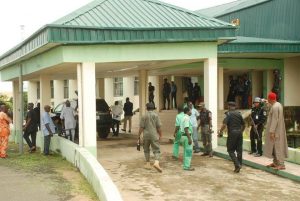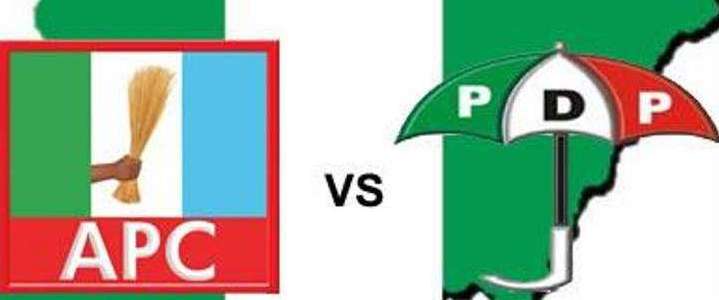Nigeria woke up to listen to, read or watch on television a secret police siege on the National Assembly this morning in the capital city, Abuja. It involved blocking all access to the entrance into the National Assembly by mask wearing secret service operatives. The operation is coming ahead of an emergency meeting which would have involved the leaders of the legislative chambers which is on recess till September. No reasons have been given beyond the Nigerian officialese ‘orders from above’, suggesting a supreme authority that is beyond question.
But the earliest National Assembly members did not take kindly to such language of power and confronted the operatives. A video of the earliest encounters by one of Nigeria’s private television stations, Channels, shows the legislators contesting the declared mission of the operatives of Nigeria’s domestic spy agency – the Directorate of State Security, (DSS).
The siege has since developed into a power tussle between those for and those against the Senate-President in terms of gaining access to and control of space as well as chamber. Existing video of the scuffle puts a woman legislator in the lead in the opposition to what is being dubbed a coup against democracy. There is fear in some quarters that a strategy of a split NASS could be at work in the diffuse and confusing abracadabra.
All manner of analysis are emerging regarding this turn, the most prominent of which is that it is aimed at getting Dr Bukola Saraki impeached. Dr Saraki is among the many prominent members of the ruling party, the All Progressives Congress, (APC) who defected recently back to the main opposition party, the People’s Democratic Party, (PDP). The strategy, argues those who claim to know, was why a door was opened for APC legislators to enter the premises. But this is not independently confirmed although those who believe so say that APC legislators were told ahead and it is only the opposition’s alternative intelligence that must have alerted PDP members and the leaders.
The siege is still unfolding but it seems Nigeria might have taken a turn towards a slow motion to a meltdown that global think tanks such as Chatham House, London; the United States Institute of Peace, (USIP), the International Crisis Group, (ICG); the UK Government, among others, have been predicting. Although these platforms have been specific on the 2019 elections, there is no strict separation of pre, during and post-election violence from each other and the use of secret and regular police to clear perceived obstacles as in the drama such as started unfolding in Abuja earlier this morning might be strong signals to take note of.

President Buhari in a move that appears he is quite keen on a second term

The Benue State prelude to the NASS siege
This trend departs from the original fear that rigging will determine 2019 and that violence would only start thereafter. That fear is connected to President Muhammadu Buhari’s theory of rigging which is that rigging is something that every political party does and the only difference is the relative capacity to do so by each party in an election. Since theories do not die and since the theorist has neither extended nor disowned this analogy, it stands to reason that in 2019, all the parties would be involved in rigging as they have always done. At a time when his is the ruling party, it means the fear in several quarters that the APC will, somehow, write the results of the 2019 election in many states may not be misplaced.
The opposition has claimed that President Buhari’s on-going 10-day medical leave is to allow for this particular operation because it would have all happened while he was away and he can easily argue that he has no hand in it. APC National Chairman, Adams Oshiomhole and a Senator of the party have championed impeachment of the Senate-President. Observers see this as part of a larger decay in the system and the fear that this might be the eve of a meltdown worse than the insecurity impasse is not misplaced. It is still a waiting game!




























